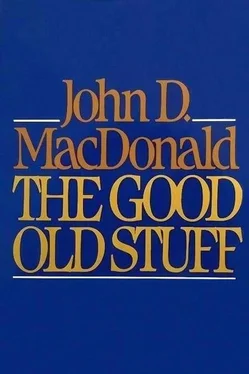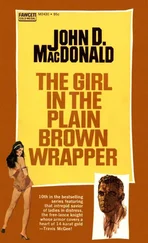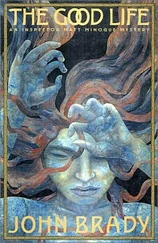As dawn paled the eastern sky, the kitchen lights went on, slanting yellow-orange oblongs out onto the packed dirt of the dooryard, and he could see her, tall, as she moved about in the kitchen, putting the coffee on before going back to her bedroom to exchange the robe for the cotton dress and sweater that she usually wore. The sweater was a heavy maroon cardigan, too large for her, and he suspected that it had belonged to Lopat. Somehow, this past month, when he thought of Marra Allen wearing Lopat’s sweater, an ugly anger thickened within him. He recognized the potential danger of his attitude and sought to recover his original indifference, but without any particular success.
In the night watch you could think of taking this Marra Allen, with her ignorance and her superstitions and her unlettered tongue, and becoming Pygmalion, because there was no denying that her slim loveliness was more than just an attribute of youth. The bone structure was good, and she would take beauty to her grave. And French told of the innate fastidiousness, the kitchen shades drawn, the water heated each night in the big tub in a countryside where Saturday baths were a mark of eccentricity.
And also, in the long night, you could think of her breathing softly in sleep on her bed and think of how her warm breath would come from lips parted just a bit, probably, and the golden hair spread over the pillow. She was three hundred feet away, and one night you quite calmly stepped over to the birch which was white in the starlight and clubbed it hard with your clenched fist, later sucking the swollen knuckles, but cured for the moment.
Barry Raymes had always been a quick and competent — though shy — man, with a wide dark line in his mind separating right from wrong. The frequency with which his thoughts and his dreams turned to Marra Allen disturbed him because he sensed wrongness in a Bureau agent’s involving himself personally with any female in any case, no matter what intrinsic worth said female seemed to possess.
Sturdevant and French both made the usual, the expected, jokes about the midnight-to-eight trick, and the obvious advantages pertaining to the hour, and in the beginning he had laughed in the expected way and hinted broadly of the mythical delights of such an assignment, but of late he had felt the flush on the back of his neck, and laughter had not been as easy.
When she returned to the kitchen the dawn light was brighter, paling the artificial light from the kitchen. She opened the kitchen door and looked over toward the small side road where his car was hidden in the heavy brush. The light behind her outlined her, and the morning wind caught at the hem of the cotton dress.
He had long since decided that there was no compromise of Bureau directives involved. The SAC — Special Agent in Charge — had made it quite clear that it would be impossible to carry out the assignment without tipping off the girl. And so his conscience had been made easy. And it had become a morning custom.
He came across the dooryard, taking out the Special when he was forty feet from her. She stepped aside as usual, saying, “Morning, mister,” that look of amusement on her face as though he were a small boy playing some absurd variation of cops-and-robbers.
He went through the house as he had been taught in the School. It did not take long. Four rooms, like small boxes, on one floor. Bedroom, sitting room, storeroom, and kitchen.
When he came back into the kitchen she had put the coffee cups on the table, taking, as usual, the one without the handle.
Without turning, she said, “Find any crooks in my house?” She stood at the wood stove, turning the eggs.
“Not today.”
“Gives me a funny feeling, kinda, mister. You don’t trust me much, do you?”
“Of course I trust you, Marra. I just have to follow orders.”
“Sure,” she said, her tone weary. He sat down in his usual place, his back to the wall. She brought over the two plates of eggs, the thick-cut bacon, taking, as usual, the chipped plate for herself.
They ate in silence, and, as on every morning, she lowered her face almost to the plate for each forkful. In another woman it would have amused and partially revolted him. In Marra it seemed oddly pathetic. It seemed as though a girl of breeding sat there, intent, for some strange reason, on playing this part that had been given her. And in the depths of her gray-blue eyes he saw the deadness, a nothingness, as though a part of her had been dead — for four months.
They finished breakfast, and he found the fifty-cent piece in his pocket. He slipped it under the edge of the plate, without her seeing him do it. They had never spoken of the fee he had arbitrarily selected as proper for the morning breakfast, and he knew that she would not take the plate away until he left.
“When you people goin’ ta give up?” she asked.
“When we get Lopat.”
“He hid good, eh?”
“He hid very good. Maybe we’ll find him. Maybe he’ll come back to be found.”
She took one of his cigarettes. She sighed. “For me, mister, it might just as well be jail. When Craik was around I got to go jukin’ once in a while. Now none of the boys’ll ask me. Solly, or Tad, or Jesse or any of ’em. They know there’ll be you G’s taggin’ along.”
“Are you in love with Craik Lopat?”
“Love is a big word, mister. Craik’s always good for laughs. Big husky guy with a mean eye on him. Like a... well, like one of them mountain cats. Mean. Big white teeth. See him work out once on one of them Turner boys from Patton Ridge. Gouged an eye out of him in about three seconds.”
“Did he get into trouble just out of meanness, do you think, Marra?”
She frowned, took her time answering. “I can’t say. He always wanted a big shiny car and money in his pocket. He got fired off the gas station, and they wouldn’t take him back in the mill again because of the trouble last time. I guess he was sore at the mill and that’s why he done it.”
Barry Raymes, thinking aloud, said, “And he had beginner’s luck, all right. If they’d gotten the safe closed... if it hadn’t been payday... if that guard hadn’t lost his nerve... lots of ifs. He got thirty-five thousand, in small bills and change, and drove off in the plant manager’s car to boot and took that payroll clerk with him. That’s how we come into the picture.”
“Because of the state line?”
“He rolled the clerk out into the brush in Alabama, remember, and shot him through the stomach. The clerk didn’t die easy, Marra.”
“He was always wild-like,” she said softly. “Even when he was just a kid.”
“You were going to marry him,” he said accusingly.
“Oh, I know what you mean. He’d have given me a bad time, that’s for sure. Other women and getting likkered up and maybe slamming me around. He done that once, you know.” She laughed, almost fondly. “Gee, did I have a fat eye on me!”
“After what’s happened,” he asked, “if you had a chance to go with him, would you?”
She regarded him steadily. “Mister, I couldn’t rightly say.”
“You would, wouldn’t you?”
“I might.”
He wanted to hurt her. He pushed his chair back and stood up. He said, “You’ll find the half buck under the plate.”
She flushed. “That’s all right.”
Anger didn’t fade entirely until he was back at the car. And then he was ashamed for speaking of the money, knowing that it would make a difference between them.
Sturdevant showed up a little before eight, and Barry Raymes drove back to the small city eight miles away and went to bed.
He was up at five, had another breakfast, and went to a movie. At eleven he finished his lunch, picked up the sandwiches and coffee, and went out and relieved a bored and sleepy Paul French.
Читать дальше












